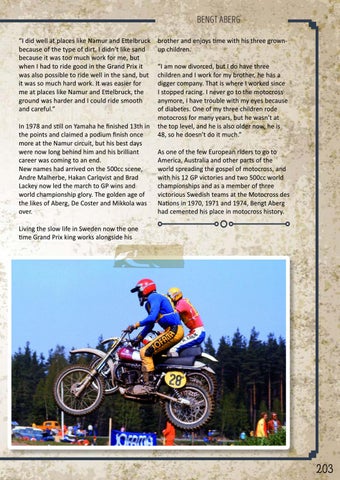BENGT ABERG “I did well at places like Namur and Ettelbruck because of the type of dirt. I didn’t like sand because it was too much work for me, but when I had to ride good in the Grand Prix it was also possible to ride well in the sand, but it was so much hard work. It was easier for me at places like Namur and Ettelbruck, the ground was harder and I could ride smooth and careful.” In 1978 and still on Yamaha he finished 13th in the points and claimed a podium finish once more at the Namur circuit, but his best days were now long behind him and his brilliant career was coming to an end. New names had arrived on the 500cc scene, Andre Malherbe, Hakan Carlqvist and Brad Lackey now led the march to GP wins and world championship glory. The golden age of the likes of Aberg, De Coster and Mikkola was over.
brother and enjoys time with his three grownup children. “I am now divorced, but I do have three children and I work for my brother, he has a digger company. That is where I worked since I stopped racing. I never go to the motocross anymore, I have trouble with my eyes because of diabetes. One of my three children rode motocross for many years, but he wasn’t at the top level, and he is also older now, he is 48, so he doesn’t do it much.” As one of the few European riders to go to America, Australia and other parts of the world spreading the gospel of motocross, and with his 12 GP victories and two 500cc world championships and as a member of three victorious Swedish teams at the Motocross des Nations in 1970, 1971 and 1974, Bengt Aberg had cemented his place in motocross history.
Living the slow life in Sweden now the one time Grand Prix king works alongside his
203
